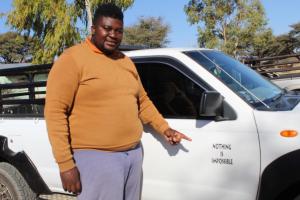Face to face with death… ‘I learned that nothing is impossible’
GOBABIS- Thirty four year-old Erwin Meroro believed he would never get sick with COVID until he was hospitalized with the disease for over two months in the Gobabis State hospital. Meroro, the patient with the longest hospital admission for COVID-19 at Gobabis State hospital narrowly escaped death. That experience changed his perspective on COVID-19 and life.
“I had this belief that brandy (alcohol) would protect me against COVID. As I lay helpless in the hospital, I thought about my previous beliefs and attitude toward the disease and I was filled with regret. That’s when I learned that you should never say never because anything can happen in this world. Nothing is impossible,” he explains.
When Meroro was discharged from the hospital, he got a label (sticker) for his car with the words: “nothing is impossible” to remind him of his battle with COVID.
“I’ll be honest with you. I never fully adhered to COVID regulations. I can say that only about 40% of the time did I really take precautions to adhere to the regulations and that was mostly in places where these were strictly enforced,” he says.
On that Wednesday morning, early in June of 2021, Meroro came down with the flu. “I also felt dizzy and very weak,” he explains. He chose to seek medical attention from a private doctor. “During that time we all had this belief that everyone who got sick with COVID was dying at the state hospital,” he related. When he saw that he was not getting better, Meroro lost all hope but decided he would go to the state hospital.
“I could see I was not getting better so I told myself, I’m done with private doctors I will hand myself over to the state and see where the state will take me,” he narrated. Meroro’s condition had deteriorated so much that he had given up on living. “When the doctors gave me medicine to drink I just drank for the sake of it. I gave up…I threw in the towel. I knew God could come anytime,” he says.
To this day, talking about his experience makes him emotional. “I thought I was a man. I thought I was strong but no,” he says. The presence of death in the hospital ward where he was admitted still haunts him, Meroro says.
“I saw at least 21 people dying in front of me. Every four hours someone was gone,” he says. “That was hard and that is what made many people give up. We were surrounded by death. People were dying all around us and some of them appeared to be responding well to treatment. So, I was thinking to myself, if this guy who was doing better than me didn’t make it, that means I’m next,” he says, as he tries to smile. His eyes betrayed him as fought back tears.
Meroro knew many of the people who died in the ward where he lay hopeless. “Some were aunties I knew very well. Others were chiefs and CEOs. I also lost my biological father and his brother to COVID during that period,” he says, considering himself lucky to have survived. “It was horrible…it was traumatic. I was bedridden with diapers and unable to respond to what people around me were saying,” he remembers.
Through this trial, Meroro says he learned to value his health. “Some of us were fighting the information given without even experiencing the misinformation that was going on at the time for ourselves. My advice to people is ‘do what is best for you and do not make decisions based on someone else’s experiences,” he says. Today, Meroro is fully vaccinated. “I also took my boosters,” he said.
Between June and August 2021, 270 people died of COVID-19 in Omaheke. The collaboration between the World Health Organization (WHO) and the United Kingdom government which led to the deployment of the UK Emergency Medical Team (UK-EMT) to Namibia during the delta wave contributed to preventing more fatalities, says the WHO’s Country Representative, Dr Charles Sagoe-Moses.
The UK-EMT was deployed to Namibia to surge capacity of the healthcare workforce, which was overwhelmed with the exponential number of cases that arose from the highly transmissible and virulent delta variant. The team also trained frontline healthcare workers on management of severe and critical cases of covid-19. “The magnitude of the pandemic was too much for any system to bear,” said Sagoe-Moses. In addition to technical support, the WHO also coordinated the United Nations and other partners in providing support to the Namibian government.
The WHO repurposed its funds initially planned for other activities towards the COVID-19 pandemic. The COVID pandemic also provided an opportunity to strengthen the Namibian health system, says Sagoe-Moses. The health system is now in a better position to respond efficiently to outbreaks as well as to detect diseases through surveillance.
“Through this pandemic the health system has taken advantage to improve the availability of oxygen in most of the country’s hospitals. The hospitals also established isolation facilities and some malfunctioning equipment were repaired. We have better mechanisms now to quickly respond to any outbreak,” said Sagoe-Moses.
Tel: +264 (0) 61 255 121
Email: kaunatjikec [at] who.int (kaunatjikec[at]who[dot]int)
Emergency Preparedness and Response/Epidemiology Officer
Tel: +264-61-255121/191
Fax: +264-61-2046202
E-mail: deweer [at] who.int (deweer[at]who[dot]int)



